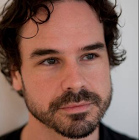Great Escape
Extreme Athleticism Is the New Midlife Crisis
People in middle age are flocking in record numbers to intense workouts and challenging races. What are they chasing?
 The last thing I remember before passing out was the pain. It had overtaken everything, hunching my back, and curling my fingers into claws pecking out incoherent thoughts on my laptop before finally collapsing. It was 3 a.m. on the morning of my 43rd birthday, and depression had finally consumed me.
The last thing I remember before passing out was the pain. It had overtaken everything, hunching my back, and curling my fingers into claws pecking out incoherent thoughts on my laptop before finally collapsing. It was 3 a.m. on the morning of my 43rd birthday, and depression had finally consumed me.
There was no clear reason as to why it was happening. Objectively, my life was good. I had a beautiful family, I owned my house, and I had a dream job covering the NBA. But I have lived with a form of mild chronic depression since I was a teenager, and depression has a way of taking everything that’s good and turning it against you. My job was a pressure cooker with endless travel and sleepless nights in hotels. My house felt like a 30-year millstone. My family tried to give me space, but all I really wanted to do was escape. That a lot of people would eagerly trade places with me only added to the feelings of guilt and negativity. I spiraled. Things had to change. I had to change.
I had been a runner for years, and it had long provided a rare respite from stress and anxiety, though it was paying diminishing returns. One day about a year ago, I noticed a trailhead that I had run by countless times without so much as a passing glance. It beckoned me to enter, and I did, plunging deep into the cool shadows of the forest. I ran until I was two towns over from where I began. I felt rejuvenated, at peace. I kept going. When I found my way out of the woods hours later, I told my wife that I was now a trail runner. Nine months later, I ran my first 50K on a cold, raw April day over 5,000 feet of vertical gain on a rugged, unmarked course.
 In 1957, a Canadian psychologist named Elliot Jacques presented a paper to the British Psychoanalytical Society on what he called the mid-life crisis. There it sat until 1965 when “Death and the Mid-life Crisis” was published in The International Journal of Psychoanalysis. Jacques’ theory was that as we approach middle age we begin to realize our own mortality, and then, consequently, we begin to freak out.
In 1957, a Canadian psychologist named Elliot Jacques presented a paper to the British Psychoanalytical Society on what he called the mid-life crisis. There it sat until 1965 when “Death and the Mid-life Crisis” was published in The International Journal of Psychoanalysis. Jacques’ theory was that as we approach middle age we begin to realize our own mortality, and then, consequently, we begin to freak out.
